Blood Test
Blood testing is a vital tool for assessing overall health and diagnosing a wide range of medical conditions. By analysing blood samples, healthcare providers can detect infections, monitor organ function, and track chronic diseases. By viewing short term tests, while considering long term context and trends, it’s a simple, fast, and effective way to stay on top of your health.
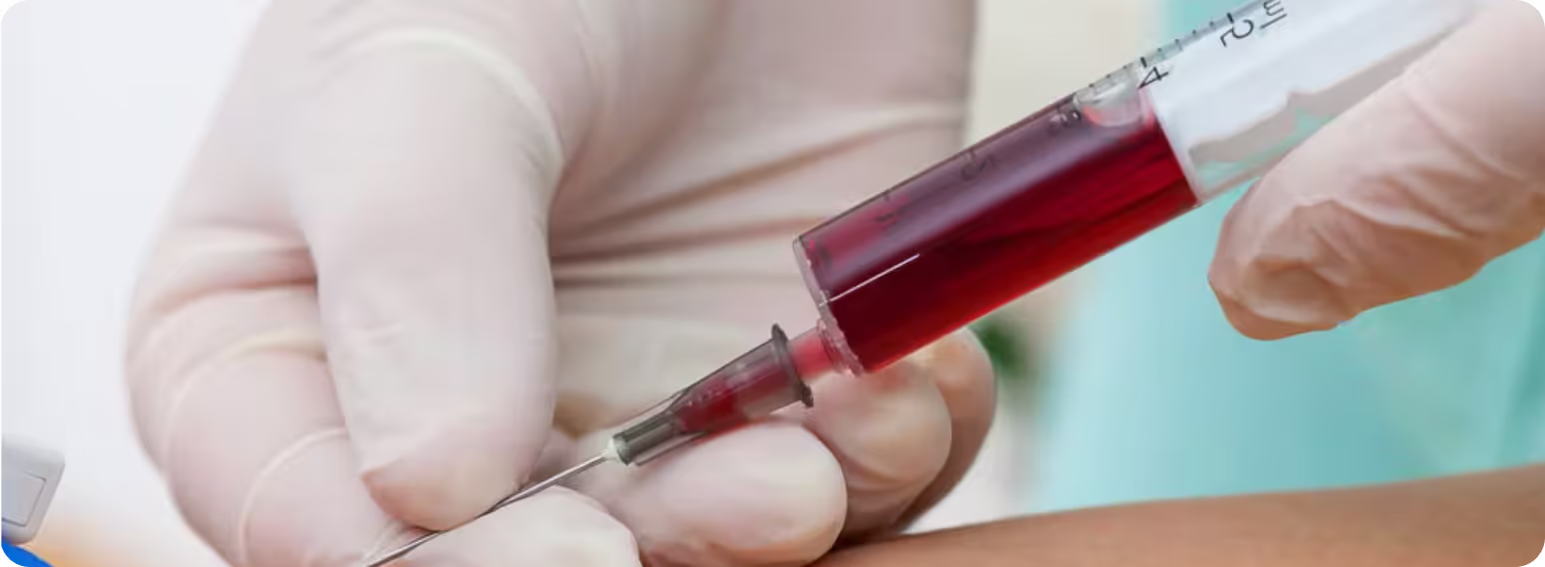
Blood Testing: The Ultimate Guide to Understanding and Benefits
What:
Blood Testing
Tests for:
Various cell types and biomarkers
Referral:
Not Required
Member cost:
$799
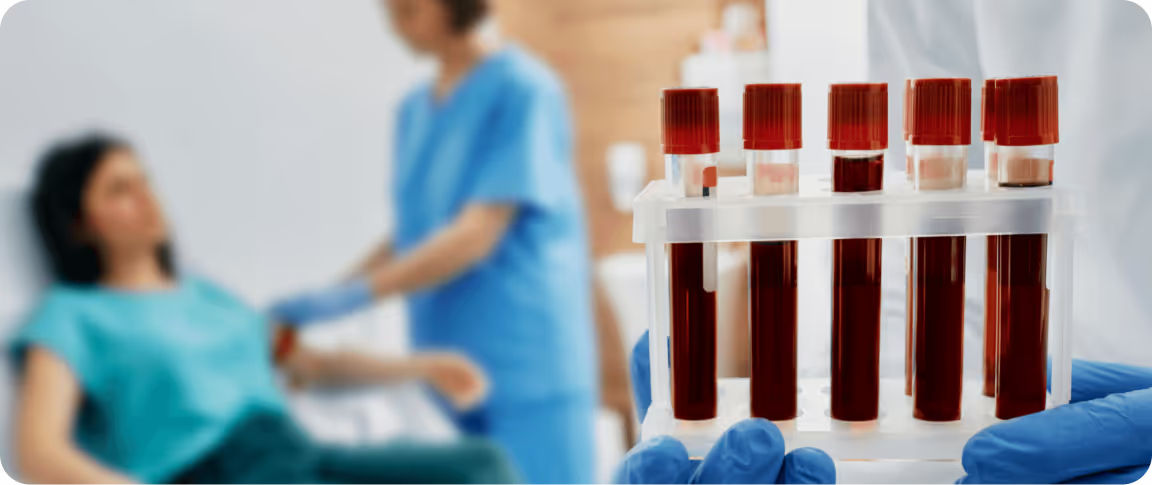
Overview: Blood Tests
What is a blood test?
A blood test is a medical procedure that involves taking a small sample of your blood to analyse various components, such as red and white blood cells, platelets, hormones, enzymes, and more. These tests are often used to assess your overall health, detect infections, diagnose conditions, or monitor ongoing medical treatments. Blood tests are one of the most common diagnostic tools in healthcare, offering a clear picture of what's happening inside your body.
Why are blood tests conducted?
Blood tests are conducted for a wide range of reasons, including routine health checks, diagnosing diseases, monitoring organ function, checking the effectiveness of medications, and screening for risk factors of chronic conditions like heart disease and diabetes. By analysing your blood, doctors can gain valuable insights that might not be visible through other means.
What are blood tests designed to show you?
Blood tests can reveal critical information about your health, including cholesterol levels, blood sugar levels, electrolyte balance, kidney and liver function, and the presence of infections or inflammation. Some tests are designed to detect specific markers that can indicate more severe conditions, such as cancer, autoimmune diseases, or hormonal imbalances.
What are the different types of blood tests?
There are many types of blood tests, each designed to assess different aspects of your health:
- Complete Blood Count (CBC): Measures the levels of different blood cells, such as red and white blood cells and platelets.
- Basic Metabolic Panel (BMP): Provides information on blood glucose, calcium, and electrolytes, and helps evaluate kidney function.
- Lipid Panel: Checks cholesterol levels, including total cholesterol and triglycerides.
- Liver Function Tests (LFTs): Measures enzymes and proteins to assess liver health.
- Hormone Panels: Evaluates hormones like thyroid, estrogen, testosterone, and cortisol to detect imbalances.
How much do blood tests usually cost?
The cost of blood tests can vary depending on the type of test and whether it’s covered by Medicare or private health insurance. In Australia, many routine blood tests are bulk-billed, meaning you may not pay anything out of pocket. However, specialised tests or those not covered by Medicare could range from $30 to over $200. It’s always best to check with your healthcare provider for an accurate estimate.
What are the most common Blood Tests?
Full Blood Count (FBC)
Measures the levels of various blood cells to assess overall health and detect conditions like infections, anaemia, and immune disorders.
- White Blood Cell Count: Evaluates your immune system by measuring white blood cells, which fight infections and indicate inflammation or immune issues.
- MCH (Mean Corpuscular Haemoglobin): Measures the average haemoglobin in red blood cells, helping diagnose different types of anaemia.
Metabolic Health
Evaluates kidney function, glucose, and electrolytes to monitor key body functions and overall health.
- Glucose: Assesses blood sugar control, helping diagnose and manage conditions like diabetes.
- HbA1c (Glycated Haemoglobin): Measures average blood sugar over the past few months, crucial for diabetes management.
- Cholesterol Levels: Measures cholesterol and triglycerides to assess heart disease risk and guide treatment.
- Cortisol Levels: Evaluates stress hormone levels to diagnose adrenal dysfunctions and manage stress-related conditions.
- Insulin Levels: Assesses blood sugar regulation and insulin resistance, a precursor to type 2 diabetes.
- Lipoprotein(a) (Lp(a)): Lp(a) is a genetically determined LDL cholesterol linked to higher heart disease risk, even with normal cholesterol levels.
- High-Sensitivity Troponin: Detects minor heart damage, critical for diagnosing heart attacks.
Vitamin and Mineral Tests
Evaluates levels of essential nutrients that support energy, immunity, and bone health.
- Vitamin D: Ensures optimal bone and immune health, preventing conditions like osteoporosis and infections.
- Iron: Monitors red blood cell production and prevent anaemia-related fatigue and weakness.
- Magnesium: Helps maintain muscle, nerve, bone health, and heart function, guiding supplementation if needed.
- Zinc: Supports immune function, wound healing, and growth, ensuring optimal immune health and recovery.
Liver Function Tests
Measure liver enzymes and proteins to assess liver health and its ability to filter blood and process nutrients.
- ALT and AST: Enzymes that indicate liver damage or inflammation when elevated, helping to detect liver conditions like hepatitis or fatty liver disease.
- Bilirubin: Assesses liver and bile duct function, with high levels indicating potential liver issues or bile obstruction.
- Prothrombin Time (PT) and Activated Partial Thromboplastin Time (aPTT): Measures blood clotting speed, crucial for diagnosing bleeding disorders and monitoring liver function.
Getting a Blood Test
What should I do to prepare for my blood test?
Preparation for a blood test depends on the type of test you're having. Some tests may require fasting for 8-12 hours, while others have no special requirements. Always follow the instructions provided by your healthcare provider or testing clinic. Drinking plenty of water before your test can make the blood draw easier.
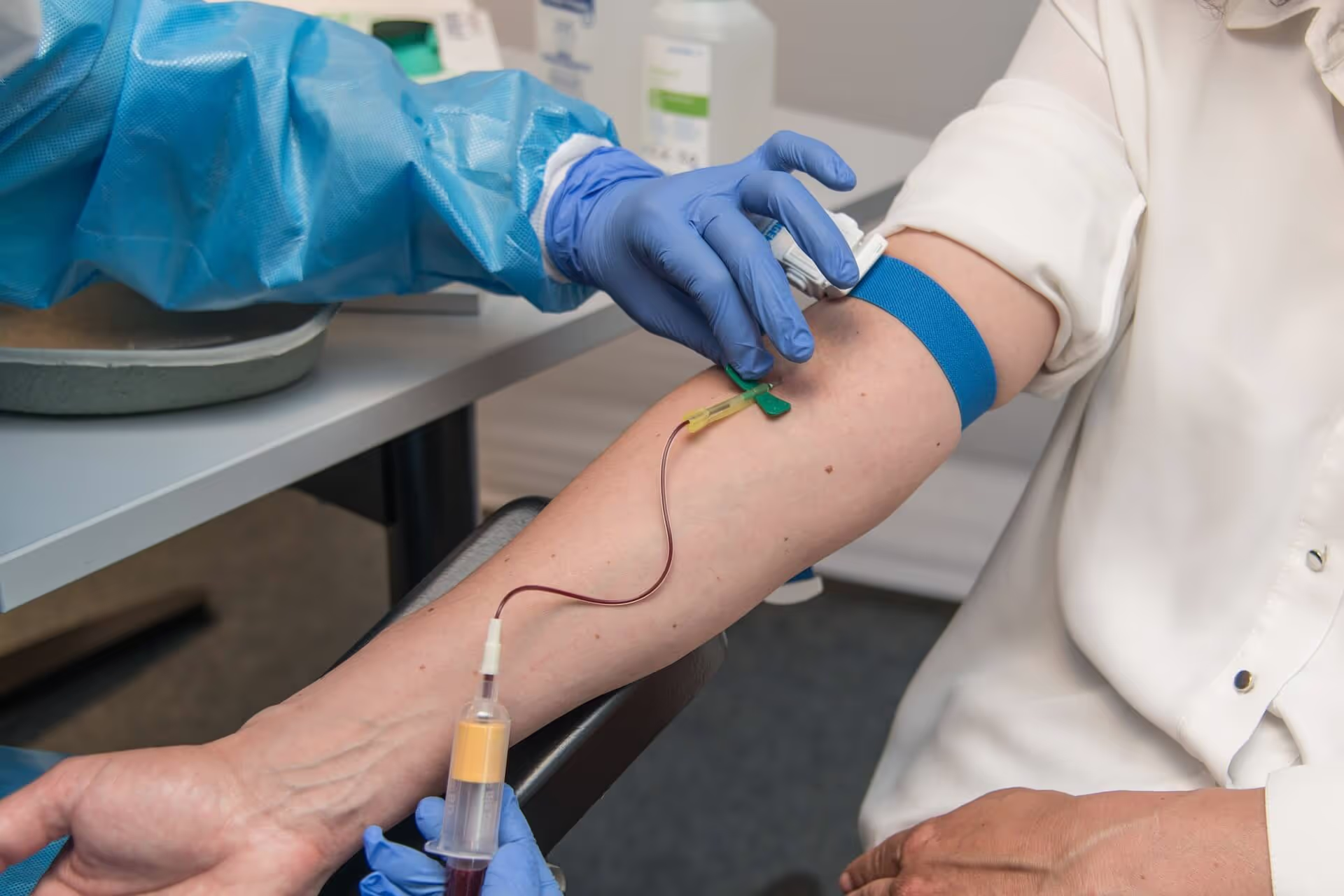
What’s the process of getting a blood test?
The process of getting a blood test is simple. A tourniquet is placed on your arm to make the veins easier to locate, and the area is cleaned with an antiseptic wipe. A small needle is inserted into a vein, usually in the arm, to collect the blood sample. These samples are then taken to laboratories and analysed. Immediately after the test, the collector will give you a cotton ball will be given to you, and ask you to apply pressure to the area.
How long does a blood test go for?
A blood test usually takes just 5-10 minutes. Some specialised tests may take slightly longer depending on the number of samples required. After the blood is drawn, you can resume your normal activities immediately, unless advised otherwise by your healthcare provider e.g. no heavy lifting.
How much blood is taken?
Typically, only a small amount is drawn, usually between 5-10 mL per test tube. In most cases, no more than a one or two tubes of blood are needed. Even with multiple tests, the total volume is generally minimal, and your body quickly replaces the lost blood without any noticeable effects.
Do blood tests hurt?
Most people feel a brief sting or pinch when the needle is inserted, but the discomfort is usually minimal and only lasts a few seconds. If you’re particularly sensitive or nervous about needles, let the healthcare provider know - they can help make the experience as comfortable as possible.
How can I relax before my blood test?
Focus on breathing slowly and deeply: in through your nose, and out through your mouth. Bringing a friend, listening to calming music, or even distracting yourself by reading can also help.
Your Results
How long does it usually take to get your results?
Routine tests are typically available within 1-2 days, while more specialised tests can range from a few days to over a week. Your healthcare provider will inform you of when to expect results based on the specific tests ordered.

What do Everlab test results look like?
At Everlab, we process your results and display them on an easy-to-view, comprehensive multi-panel dashboard. These results are coloured green, yellow and red, based on your personalised perceived risk, and are displayed alongside your historical data.
Do I need to send my blood test results to Everlab?
When you complete your onboarding and Everlab requested tests, results will automatically be sent from your provider to your Everlab profile.
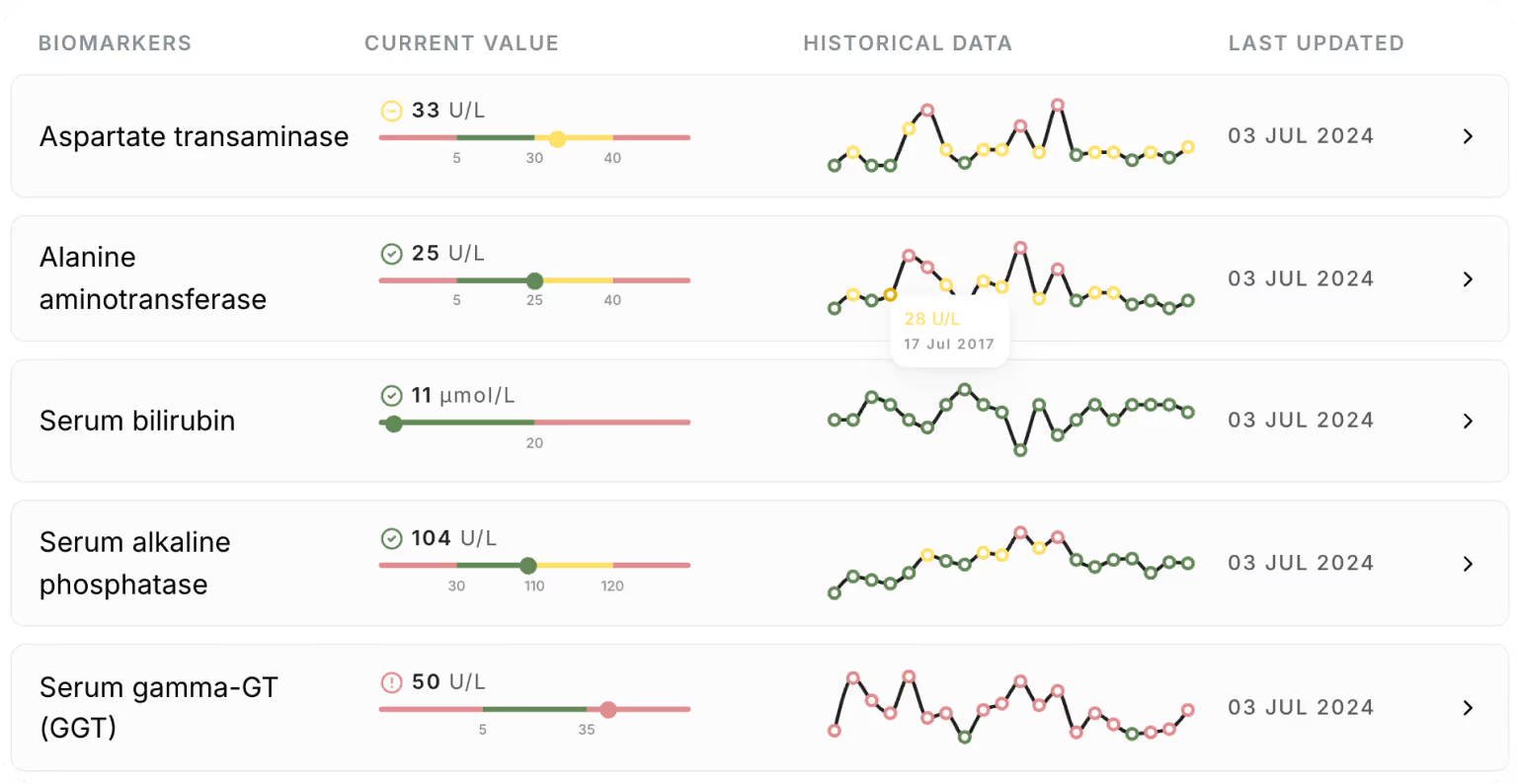
What do the results mean?
Blood test results provide information about your health. Values within the normal range usually indicate that your body is functioning as expected. Abnormal results can suggest health issues or imbalances, but they don’t always mean something serious. At Everlab, your doctor will interpret the results in the context of your overall health and medical history, and guide you on next steps.
What do you do if you get an abnormal blood test result?
Abnormal results don’t always indicate a serious condition. Your healthcare provider will review the results with you and may suggest further testing, monitoring, or lifestyle changes. In some cases, abnormalities can be temporary or related to medications you’re taking.
My healthcare provider wants to talk to me about my results. Does that mean something’s wrong?
Not necessarily. Healthcare providers often discuss results to explain them in detail, whether they are normal or abnormal. A discussion may be required to go over complex results, recommend lifestyle changes, or plan follow-up tests. It’s important to remember that even minor variations in results may prompt a conversation for clarity or additional information.
What to ask your doctor about your blood test?
Knowing what to ask your doctor can make all the difference in understanding your health. Questions like “What do these results mean for my risk of future health problems?” or “Should I make any lifestyle changes based on these results?” can provide clarity and guide your next steps.
Should you request a second opinion?
If your blood test results are unusual or unexpected, consider discussing them with another healthcare provider. A second opinion can provide reassurance, alternative perspectives, or additional recommendations for further testing, helping you make informed decisions about your care.
Can blood tests miss health problems?
While blood tests are powerful diagnostic tools, they’re not infallible. Some conditions may not be detected through blood tests alone, especially in early stages or if symptoms are subtle. This is why a holistic approach, considering your symptoms, history, and additional tests, is key to a thorough health assessment.
How reliable are blood tests for rare conditions?
Blood tests for rare conditions can be less straightforward, sometimes requiring specialized testing or interpretation by experts. If your results point to a potential rare disorder, your doctor may recommend further testing or refer you to a specialist for more comprehensive evaluation.
Risks & Side Effects
What are the risks of getting a blood test?
Blood tests are generally safe, with minimal risks. Some people may experience slight bruising, lightheadedness, or fainting. Rarely, there can be infection at the puncture site.
What happens if you are prone to getting faint from blood tests?
If you're prone to fainting, inform the healthcare provider before the blood draw. Lying down during the test, staying hydrated, and eating beforehand (if not fasting) can help minimise fainting risks.
What are the after care recommendations for blood collection?
Clinical Labs Australia has several recommendations. After your blood test, it’s important to apply gentle pressure to the puncture site for a few minutes to stop any bleeding. Keep the bandage on for at least 30 minutes. For the rest of the day, avoid tight clothing around the arm, heavy lifting or strenuous activities. If bruising or soreness occurs, elevating the arm and applying an ice pack can help.
What else do I need to understand?
Can you get a blood test done at home?
It’s often recommended to visit a clinic for accuracy. Sometimes, doctors are able to accommodate for home visits, but this will need to be arranged. It is not recommended to draw your blood yourself. Everlab can arrange for you a home blood test if required.
Are the results of a blood test always accurate?
Blood test results are generally very accurate, but several factors can affect their precision. Variables like improper fasting, dehydration, or medications can alter results. Additionally, lab errors, while rare, can occur. If a result seems inconsistent with your symptoms or history, your healthcare provider may recommend repeating the test.
Can a blood test indicate whether you have cancer?
While blood tests alone cannot diagnose cancer, certain tests can suggest the possibility of cancer by detecting tumour markers or abnormalities. These tests, such as those measuring elevated levels of CEA or PSA, may indicate the need for further diagnostic procedures, like imaging or biopsies. However, most cancers require additional testing for a definitive diagnosis.
You can find more information about the different types of blood tests here.
Are Blood Tests Always Necessary?
Many people believe that blood tests are always needed to diagnose a condition, but that’s not always the case. Blood tests are invaluable tools, but not every health concern requires them. Your healthcare provider will recommend tests based on symptoms, medical history, and specific health needs, ensuring you only undergo what’s essential.
Track your blood test results over time to see the real impact.
Here’s an example of how taking blood tests and visualising trends over time can prevent disease. “Data trends allow us to see patterns that single data points don’t reveal. Over the years, various doctors requested medical tests at different labs. These fragmented results, coupled with fluctuating outcomes, led to inaction. However, when zooming out, we see a gradual rise. Matched with their increasing but subtle symptoms, it gave us immediate clarity to initiate her treatment.” -Chief Medical Officer at Everlab, Dr Steven Lu
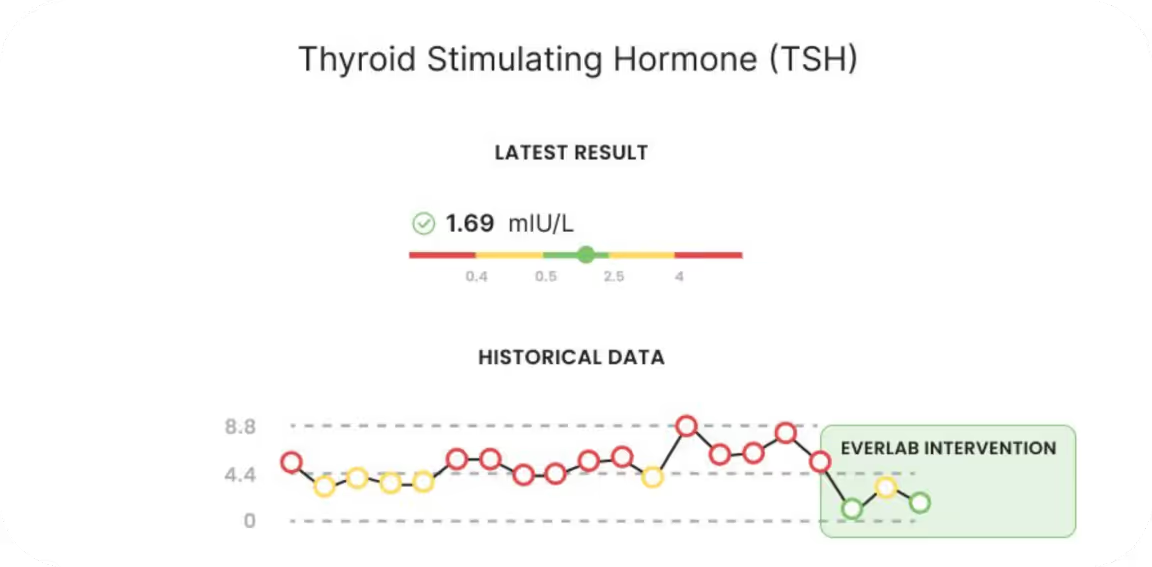


imaging

biomarkers

sterols
Book a Free Discovery Call
Join 20,000+ Australians improving their health with proactive, personalised healthcare.